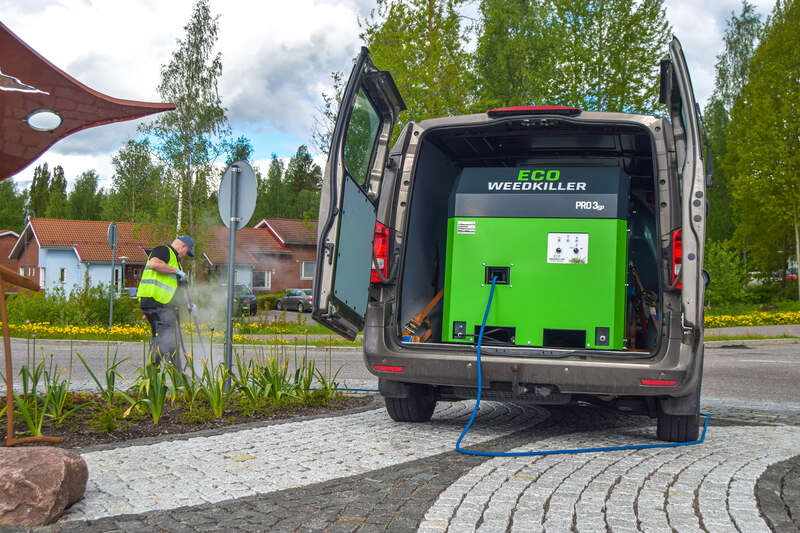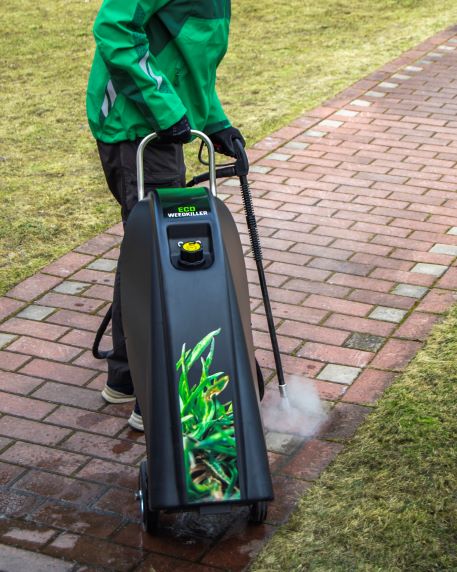Why use hot water to kill weeds?
Looking for a truly environmentally friendly weedkiller? We have a fantastic solution in the form of Hot Water weed control products from Eco Weedkiller in Finland.
Simple yet effective - Using boiling water to treat weed
Eco Weedkiller offers new technology for weed control based on hot water. The water is
heated via electricity and then kept hot in an insulated tank. The device will keep its
warmth (more than 100 degrees Celsius) for at least eight hours after disconnecting the
power. The device does not need to be connected to the electricity network or water supply
during use making it very easy to take anywhere.
There are versions with a 300-litre and 600-litre storage tanks as well as a small Garden
version with a 25-litre water tank.

Using hot water allows great penetration into the soil, providing successful treatment of
perennial plants with more established root systems in many situations. The rule of thumb
is that 2–2.5 litres of hot water is needed per square metre in areas with 100% greenery
coverage. This means that 300 litres of water is enough for 100–150 green square metres.
The choice to use hot water to control weeds ensures considerably smaller lifecycle effects
(LCA) than the choice to use herbicides. The lifecycle effects typically associated with this method are
mostly due to the use of diesel fuel usually needed to operate this kind of device, but the Eco Weedkiller does not require the use of a diesel generator to maintain the water temperature.
As the professional community is well aware, the use of glyphosate has been discussed
worldwide. In the summer of 2015 The International Agency of Research on Cancer (IARC), a
semi-autonomous unit of World Health Organization (WHO), issued a report stating that
glyphosate is a substance that “probably causes cancer in people”.
The European Union (EU) gave the use of glyphosate an extension until the end of 2017. In
2017 the EU member states renewed the marketing authorization for another five years,
until 2022, after a tight vote. The European Parliament has given a resolution in which it
proposes to phase out the use of glyphosate by the end of 2023.
This year, the UK government will produce it's own National Action Plan for the Sustainable use of Pestcides,
which aims to greatly reduce the use of pesticides in both Agriculture and Amenity.
Meanwhile, many countries and organizations demand a ban for the use of glyphosate, and
social pressure encourages choosing non-chemical methods to control weeds, regardless of
legislation.
The effect of hot water in weed control is based on a sudden surge of thermal energy, which
damages plant tissue. Water is a great medium in transferring heat due to its great heat
capacity of 4.18 kj/K. In comparison, the heat capacity of steam and air is 2.08 and 1.01
respectively.

Many plants have a natural mechanism to protect them from fire, but since hot water is not
a natural threat to plants, they have not developed mechanisms to protect themselves
against it. Since water enters the vegetation and root system of a plant, thermal weed
control makes it possible to kill plants, and eventually their roots as well.
The machine uses electricity to heat the water to the desired temperature and then keeps it
hot using a specially insulated tank and keeping the water under pressure. This means there
is no need to burn fuel all day to keep the water hot.
The electricity used to do the heating could be supplied from any source, including solar
energy for example; which makes it possible for the product to be extremely
environmentally friendly.
The output of the Eco Weedkiller is simply boiling water, which is very clean and safe for the
environment, and makes it safe to use in many areas where herbicides such as glyphosate
are unsuitable or simply undesirable.
Further to this you can make this solution more efficient and cost effective by following a
Weed Prevention Strategy. Find out more about Weed Prevention strategies here.
Find out more about our range of EcoWeedKiller products here.
The YouTube video for the Eco WeedKiller Pro3 and Pro10 can be found here.
No comments yet. Login to start a new discussion Start a new discussion